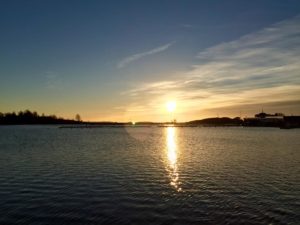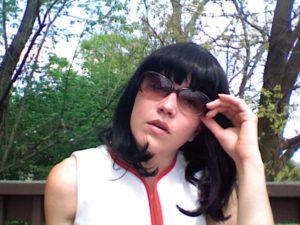
Your name: Courtney Sina Meredith
Current city or town: Auckland, New Zealand
How long have you lived here: All my life
Three words to describe the climate: Changeable, independent, shifting
Best time of year to visit? January to March

Your name: Courtney Sina Meredith
Current city or town: Auckland, New Zealand
How long have you lived here: All my life
Three words to describe the climate: Changeable, independent, shifting
Best time of year to visit? January to March
New poems from our contributors: please welcome newcomers to The Common, Mik Awake and Elizabeth Scanlon, and welcome back L. S. Klatt and Ben Mazer.
With ANTTI TUOMAINEN

One of Antti Tuomainen’s favorite places in Helsinki is the beautiful Kaivopuisto park and the Baltic shore on the southernmost tip of downtown Helsinki, pictured here on a December morning.
Your name: Antti Tuomainen
Current city or town: Helsinki, Finland
How long have you lived here: 44 years
By MARTHA PARK
 Deer Neighbor, hand-pulled linocut
Deer Neighbor, hand-pulled linocut
When the radiators overheat we try to turn the knobs wearing oven mitts. At night it’s too hot to sleep, and we open the windows to the cold December air. My nose bleeds intermittently, suddenly, all winter long. I wake in the night to the hot rushing smell of iron, or, elbow-deep in dishwater suds, feel the blood coming too quick to stop.
I first went to London as an undergrad, on a yearlong study abroad program in University College London’s intimidating English department. When I returned very reluctantly to the US, I often dreamed about London, but in those dreams I would find familiar places moved, distorted, and the people I missed not where I looked for them. After graduation, I moved again to the UK for a master’s program, but mainly to get back to London. I had discovered, after a few panicky weeks of foreign disorientation, that the city suited me—and also that my quiet home in Massachusetts no longer did. At 22, one seemed to preclude the other; London felt strange and exotic in a way that had become a daily necessity.

There exists a certain splendor in the protestations of the electorate on the grounds of the Elected. Here, in the southern wing of the Nebraska State Capitol, roughly 75 farmers, ranchers, environmentalists, Native Americans and other dissidents have gathered to oppose construction of the Keystone XL pipeline, and more specifically, the Governor’s authority to approve the pipeline’s path through Nebraska. They’ve come wearing belt buckles and Wrangler jeans, bolo ties and t-shirts that scream “Pipeline Fighter” and “#NOKXL.” But it’s difficult, in these marbled and dimly lit halls, not to feel awed by the stature of it all, the history cast in bronze and embossed beneath your feet. Even the atheist may be overcome by the grandeur of a cathedral.

When I was growing up, my family was in Long Beach regularly visiting my aunt Carol and uncle Rocco, friends of my parents who lived blocks from the ocean. My memory insists that it was always summer when we were there: barbecues, somebody’s birthday. And the Fourth of July parties, all-day affairs the adults would spend on the stoop eating burgers and macaroni salad while us kids—myself, my older brother, Carol and Rocco’s son, Matt, some neighborhood kids—played basketball in the street.
T. K. DALTON interviews JILLIAN WEISE

Jillian Weise is the author of the novel The Colony (2010) and the poetry collections The Amputee’s Guide to Sex (2007) and The Book of Goodbyes (2013), the latter of which won the James Laughlin Award from the Academy of American Poets. Her writing appears in The New York Times, The Atlantic Monthly, Granta, The New Republic, Tin House, and elsewhere. She teaches creative writing at Clemson University in South Carolina.
Book by HANNAH GERSEN
Reviewed by

The publisher of Hannah Gersen’s first novel, Home Field, is marketing the book as a cross between two TV shows about teens, Friday Night Lights and My So-Called Life. My So-Called Life, an angst-ridden and artsy TV show about teenagers in the 90s, is a better comparison than Friday Night Lights, which is about a high school football-crazy small town. But the teen-pop culture comparisons don’t do justice to this empathic literary novel’s reach into emotional depths that will resonate with seasoned readers, who appreciate how complicated even an ordinary life can get.
Yes, Home Field is set in an isolated town, Willowboro in western Maryland, that’s reminiscent of FNL’s Dillon, Texas. And yes, Dean, the main character of Gersen’s novel is a football coach, but he quits coaching football in the fourth chapter because his wife, Nicole, has committed suicide, and his family is unraveling. Gersen chips away at her characters’ façades like a miner removing layers of rock. The novel alternates between Dean’s perspective and that of his stepdaughter, Stephanie, but also follows Dean’s two young son’s Robbie, eleven, and Bry, eight, as they attempt to understand what happened to their mother.

One Wednesday morning late in the rainy season of 1964, I sat at the open window of my room overlooking the tiny hill town of Kunchha, where I lived. I was watching huge clouds expand overhead, upward and outward across the blue Himalayan sky. I knew that by noon the temperature and the humidity would rise proportionately. Those cumulonimbus clouds are the largest, most magnificent and dramatic of the nimbuses, and experience told me that they were the harbingers of a rainstorm that would blow in around tea time.